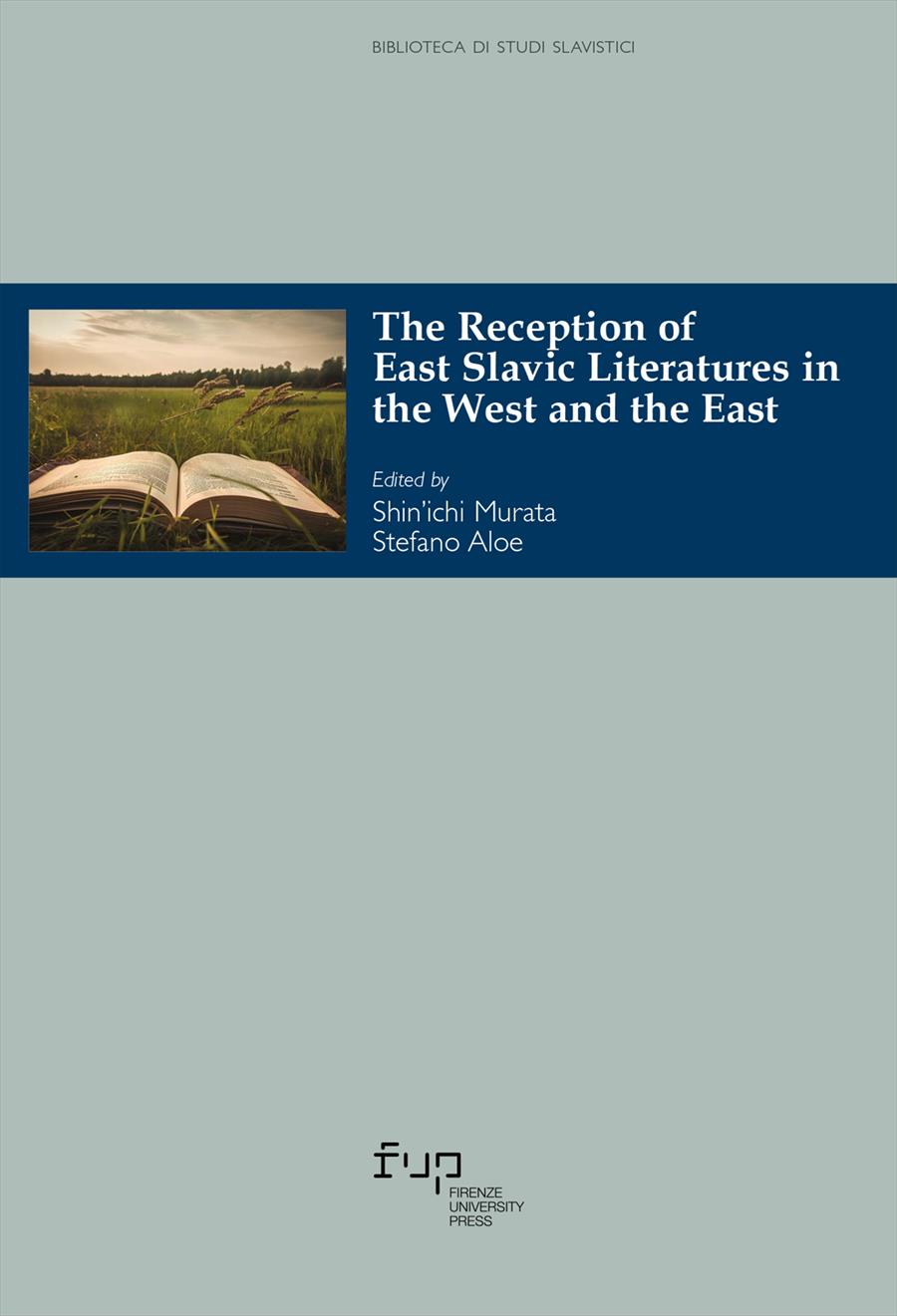- The Reception of East Slavic Literatures in the West and the East
- Edited by Shin’ichi Murata, Stefano Aloe
Vladivostok as a Meeting Point between West and East at the Beginning of the 20th Century (Around Years of Siberian Investigation)
- Kumi Tateoka
- © 2023 Author(s) |
- CC BY 4.0
- DOI: 10.36253/979-12-215-0238-1.16
Vladivostok is likened to the Bosphorus. The remoteness of the Far East made it difficult for the European part of the Russian Empire to recognise Vladivostok geographically. Therefore, through analogy to the Mediterranean, it was consciously integrated into the state. On the other hand, by using kanji combinations, which evoke images of traditional Japanese poetry, the Japanese created a sense of familiarity with Vladivostok. In most cases, regarding the social situation during the Revolutionary and Intervention War periods, researchers’ interest was restricted to the scheme of the conflict between the Red Army and the White Army and the victory or defeat of the October Revolution. However, more than 30 years after the dissolution of the USSR, the events of this period are now being examined by scholars mainly from the perspective of the residents and outsiders in various regions who, without knowing the consequences of the revolution, were both anticipating and anxious about significant social changes. The multicultural nature of the Far East is being discussed on the occasion of the centenary of the Siberian exodus. This article examines the cultural situation in and around Vladivostok, focusing on developments such as the education system and modernist currents in the arts. Vladivostok served as both an entrance to Siberia for the Japanese or other foreign troops and an exit for emigres.
- Keywords:
- Vladivostok,
- Siberian intervention,
- Multicultral and multinational society,
- Ethnic language education,
- Centre and periphery,
University of Tokyo, Japan - ORCID: 0009-0008-4625-8097
- Morris-Suzuki, Tessa. 2000. View Of The Frontier – The Modern Experience Of The Ainu Japanese Language Book. u.p.
- [Asada, Masafumi. 2016. Siberian Expeditionary Force: Modern Japan’s Forgotten Seven Years’ War. Tokyo: Chuko shinsho]. 麻田雅文『シベリア出兵 : 近代日本の忘れられた七年戦争』東京:中央公論新社、2016年.
- [Hara, Teruyuki. 1998. The Story of Vladivostok, a Russo-Asian Crossroad City. Tokyo: Sanseido]. 原暉之『ウラジオストク物語 : ロシアとアジアが交わる街』東京:三省堂、1998年.
- [Hashimoto, Tetsuya. 1992. “The Establishment of the Ushio Nippo and the Siberian Expedition.” Kanazawa University Economic Review 12 (2): 69-91]. 橋本哲哉「浦潮日報の成立とシベリア出兵」『金沢大学経済学部論集』12巻2号、1992年。69-91頁.
- [Himeda, Mitsuyoshi, ed. 2012. History of regional exchange in North and Northeast Asia. Tokyo: Yuhikaku]. 姫田光義編『北・東北アジア地域交流史』東京:有斐閣、1999年.
- [Ito, Ichiro. 2019. “Crimea as a Text”. In Galitsia Forest: comparative literature and culture in Slavic Eastern Europe, 237-61. Tokyo: Suisei-sha]. 伊東一郎『ガリツィアの森 : ロシア・東欧比較文化論集』東京:水声社、2019年.
- [Morgun, Zoya. 2016. The Japanese Mosaic of Vladivostok, 1860-1937, transl. by Wakio Fujimoto. Tokyo: Tōkyōdō shuppan]. ゾーヤ・モルグン著、藤本和貴夫訳『ウラジオストク:日本人居留民の歴史1860〜1937年』東京:東京堂出版、2016年.
- [Sato, Yoshiyuki, and Igor’ R. Savel’ev. 2004. Journey to Vladivostok: the people who settled in the Russian Far East. Niigata: Niigata Nippo Jigyo-sha. 佐藤芳行、イゴリ・サヴェリエフ『ウラジオストクへの旅 : ロシア極東地域に移住した人々』新潟:新潟日報事業社、2004年.
- [Sato, Youichi. 2011. Vladivostok in the Imperial Period. Historical research on the formation of the city. Tokyo: Waseda UP]. 佐藤洋一『帝政期のウラジオストク : 市街地形成の歴史的研究』東京:早稲田大学出版局、2011年.
- [Sharko, Anna. 2020. “On the kanji representation of Vladivostok in Japan.” In Investigations into Modern Japanese, ed. by the Society for the Study of Modern Languages in Japan, 143-58. Tokyo: Bensei-shuppan]. シャルコ アンナ「日本における『ウラジオストク』の漢字表記」日本近代語研究会編『論究日本近代語』東京:勉誠出版、2020年。143-58頁.
- Александрова, Екатерина С. 2018. “Художественная жизнь Приморья в 1917-1922 гг. в объективе пассионарной теории Л.Н. Гумилёва.” В кн. Перспективы развития науки в современном мире, сб. статей по материалам XII международной научно-практической конференции. Том 2, ч. 2, 190-96. Уфа: Дендра.
- Виловатая, Елизавета С. 2015. “Особенности художественной жизни Владивостока в период революций 1917 года, гражданской войны и интервенции.” Современные проблемы науки и образования 2(1), https://science-education.ru/ru/article/view?id=20867 (10/10/2023)
- Дударенок, Светлана М. 2018. “Церковь адвентистов седьмого дня Дальнего Востока России в годы Гражданской войны и иностранной интервенции.” В кн. Гражданская война и интервенция на Дальнем Востоке России: причины, особенности, участники. Материалы международной научной конференции 23-24.10.2018, 167-71. Владивосток: ИИАЭ ДВО РАН.
- Кириллова, Елена О. 2018a. “Литературная ситуация Дальнего Востока времён гражданской войны и интервенции и русская эмигрантская журналистика в АТР (малоизвестные страницы).” В кн. Литература и культура Сибири, Дальнего Востока и Восточного зарубежья. Проблемы межкультурной коммуникации. Статьи участников VIII Всероссийской научно-практической конференции с международным участием, 16 февраля 2018 г., отв. ред. А.А. Новикова, 6-13. Владивосток: Дальневосточный фед. университет.
- Кириллова, Елена О. 2018b. “Пути развития русской литературы на Дальнем Востоке России в годы Гражданской войны и интервенции. 1917-1922 гг. как особый историко-литературный период. Гражданская война и интервенция.” В кн. Гражданская война и интервенция на Дальнем Востоке России: причины, особенности, участники. Материалы международной научной конференции 23-24.10.2018, 172-80. Владивосток: ИИАЭ ДВО РАН.
- Лынша, Ольга Б. 2017. История образования в Никольске-Уссурийском. 1882-1922 гг. Владивосток: Дальневосточный федеральный университет, http://uss.dvfu.ru/e-publications/2017/lynsha-ob_istoriya_obr_v_nikolske-ussuriiskom_2017.pdf (10/10/2023)
- Лынша, Ольга Б. 2018. “История Никольск-Уссурийской корейской учительской семинарии- 1918-1923 гг.” В кн. Гражданская война и интервенция на Дальнем Востоке России: причины, особенности, участники. Материалы международной научной конференции 23-24.10.2018, 159-67. Владивосток: ИИАЭ ДВО РАН.
- Мизь, Нелли Г. 2013. Япония – Российское Приморье: люди и судьбы. Владивосток: Изд. дом Дальневост. федерал. ун-та.
- Прантенко, Надежда А. 2011. “Василий Баталов – первый приморский художник-педагог.” Гуманитарные исследования в Восточной Сибири и на Дальнем Востоке 1: 25-7.
Chapter Information
Chapter Title
Vladivostok as a Meeting Point between West and East at the Beginning of the 20th Century (Around Years of Siberian Investigation)
Authors
Kumi Tateoka
Language
Russian
DOI
10.36253/979-12-215-0238-1.16
Peer Reviewed
Publication Year
2023
Copyright Information
© 2023 Author(s)
Content License
Metadata License
Bibliographic Information
Book Title
The Reception of East Slavic Literatures in the West and the East
Editors
Shin’ichi Murata, Stefano Aloe
Peer Reviewed
Number of Pages
326
Publication Year
2023
Copyright Information
© 2023 Author(s)
Content License
Metadata License
Publisher Name
Firenze University Press
DOI
10.36253/979-12-215-0238-1
ISBN Print
979-12-215-0237-4
eISBN (pdf)
979-12-215-0238-1
eISBN (epub)
979-12-215-0239-8
Series Title
Biblioteca di Studi Slavistici
Series ISSN
2612-7687
Series E-ISSN
2612-7679
